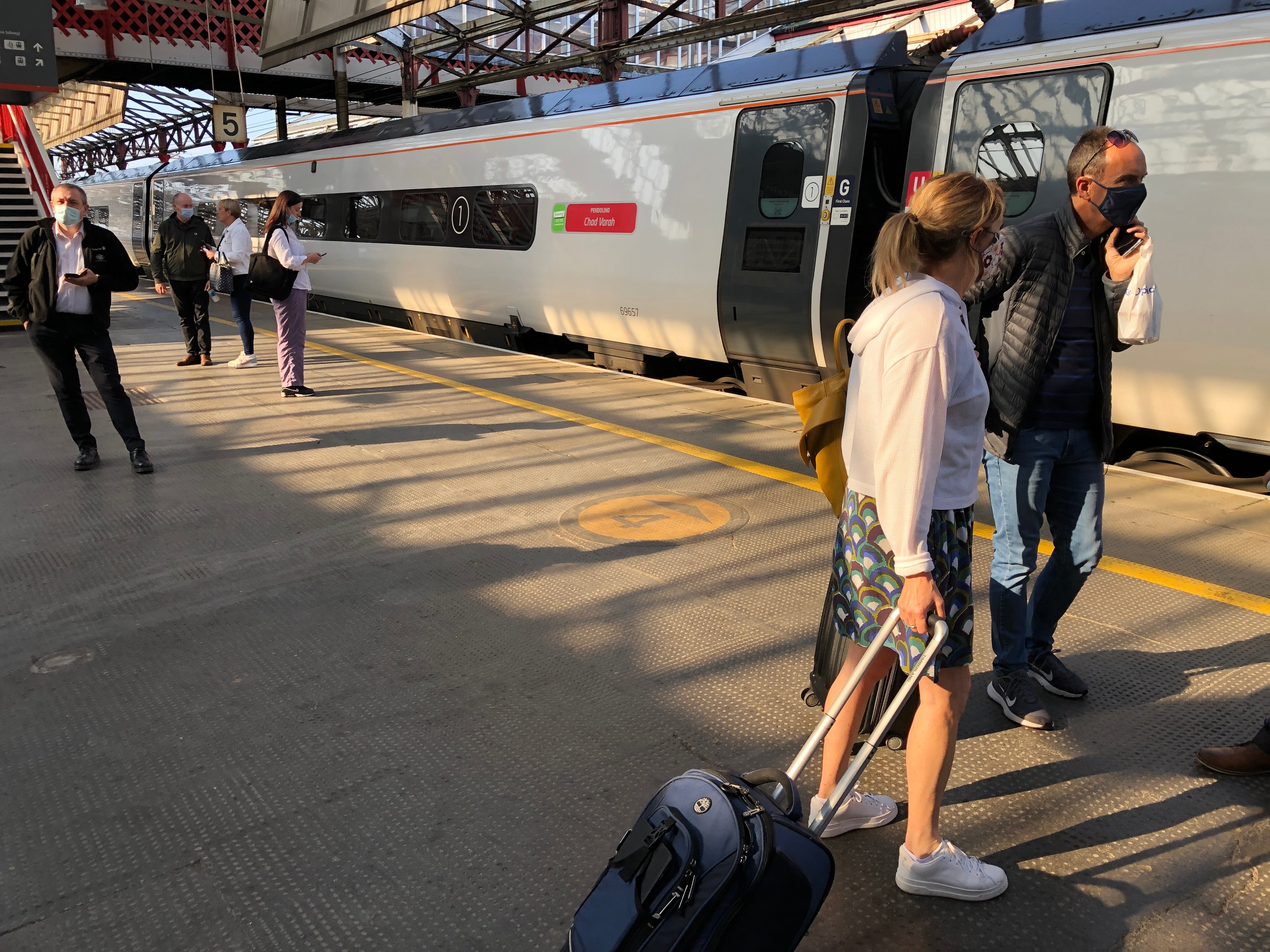Avoid weekends for rail travel this summer, train operators urge
Exclusive: August bank holiday weekend is expected to see the biggest crowds – with engineering work making journeys complicated

Your support helps us to tell the story
From reproductive rights to climate change to Big Tech, The Independent is on the ground when the story is developing. Whether it's investigating the financials of Elon Musk's pro-Trump PAC or producing our latest documentary, 'The A Word', which shines a light on the American women fighting for reproductive rights, we know how important it is to parse out the facts from the messaging.
At such a critical moment in US history, we need reporters on the ground. Your donation allows us to keep sending journalists to speak to both sides of the story.
The Independent is trusted by Americans across the entire political spectrum. And unlike many other quality news outlets, we choose not to lock Americans out of our reporting and analysis with paywalls. We believe quality journalism should be available to everyone, paid for by those who can afford it.
Your support makes all the difference.Rail passengers are being urged to travel midweek where possible this summer ahead of the summer holidays in England and Wales.
Weekends are predicted to be extremely busy, especially on trains serving coastal areas ranging from Devon and Cornwall to Cleethorpes and Skegness in Lincolnshire.
Engineering work scheduled for August will add to the problems.
The Independent asked the long-distance train operators for their forecasts for the peak times this summer.
Fridays, Saturdays and Sundays are predicted to be busiest, with some also mentioning Mondays.
International travel restrictions mean far fewer British holidaymakers will go abroad this summer – increasing demand for domestic holidays and putting pressure on the rail network.
Since the coronavirus pandemic began, passenger numbers on trains have collapsed. While road use has return to pre-crisis levels, the highest figure achieved so far on the trains this year is 52 per cent – over the weekend of 10 and 11 July.
During the remainder of July and through August, weekend passenger levels are expected to be significantly higher.
A spokesperson for CrossCountry Trains, whose network spans Great Britain from Cornwall to Scotland, said: “Reservation levels currently indicate that the West Midlands to Manchester and West Midlands to the southwest are likely to be the busiest parts of the network at weekends, with most passengers making journeys southbound towards Exeter and Plymouth on Fridays and Saturdays and returning on Sundays and Mondays.”
GWR, which links London Paddington with South Wales and the West of England, is urging passengers to travel midweek and early in the day if they are able to do so. Friday is expected to be the busiest day of the week.
Avanti West Coast, which connects the West Midlands, northwest England, North Wales and southern Scotland with London Euston, will be affected by long-planned engineering work on the West Coast main line at weekends up the end of August.
Next weekend (31 July-1 August), the line will be closed between Tamworth and Stafford, with trains diverted via Birmingham. Direct trains to and from North Wales will be cancelled.
East Midlands Railway, which operates the main line connecting London St Pancras with Leicester, Derby, Nottingham and Sheffield as well as local services, is expecting links to Skegness and Cleethorpes to be especially busy between Fridays and Mondays. Local services from Derby and Nottingham to Matlock and Matlock Bath in Derbyshire are also expected to be busy.
Across the rail network, the biggest crowds are expected to be over the bank holiday weekend from 27 to 30 August – when the East Midlands line will be closed completely south of Luton.
Work connected with the HS2 project at London Euston will also extend journey times on the West Coast main line.
A spokesperson for Avanti West Coast said: “Over the August bank holiday, our northbound trains are expected to be busy on the Friday before (27 August) and our southbound trains are expected to be busy on the Monday (30 August).”
LNER is expecting especially strong demand for Anglo-Scottish services. The principal train operator on East Coast main line is telling passengers hoping to travel over the last weekend in August: “Quieter times tend to be before 10am and after 6pm. The Thursday before and Tuesday after are usually quieter, too.”
The operator, which connects London King's Cross with Yorkshire, northeast England and Scotland, has an online “Seat Sure” rapid reservation system in place. Seats can be booked up to five minutes before departure.
Network Rail work on the East Coast main line between Grantham and Newark on Saturday 28 August means some evening journeys on the East Coast main line will be cancelled or diverted.
At a rail industry event in February, the chair of Network Rail, Sir Peter Hendy, said: “It wouldn’t surprise me if we have more demand on a summer Saturday than we do on a working weekday.
“If Saturday and Sunday get really busy, we should do engineering works some other time.”
Network Rail currently tells passengers: “We plan works for certain times so they cause the least disruption to passengers, such as on bank holidays, Sundays and overnight, when the network is less busy.”
A spokesperson for Network Rail told The Independent: “Essential maintenance and upgrade work is always planned for times that minimise disruption for passengers as much as possible, traditionally meaning holidays and weekends.
“Travel patterns have obviously shifted over the past year or so and we will carefully monitor how this evolves as restrictions ease and more people return to workplaces. Our approach to scheduling works will be based on this longer-term picture.”
Join our commenting forum
Join thought-provoking conversations, follow other Independent readers and see their replies
Comments